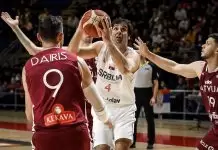 England and Scotland formally signed Sunday in London that will formalise their merger into a single British basketball organisation, despite the objections of the Welsh, ensuring that there will be a Great Britain team beyond these Olympic Games.
England and Scotland formally signed Sunday in London that will formalise their merger into a single British basketball organisation, despite the objections of the Welsh, ensuring that there will be a Great Britain team beyond these Olympic Games.
England and Scotland formally signed Sunday in London that will formalise their merger into a single British basketball organisation, despite the objections of the Welsh, ensuring that there will be a Great Britain team beyond these Olympic Games.
FIBA secretary-general Patrick Baumann has confirmed that the world governing body has approved plans to go forward with their full union post-2016, praising Basketball Scotland and England Basketball for relinquishing their separate status in favour of working together.
“What Scotland has decided has been extraordinary, to relinquish its membership of FIBA in favour of a British programme,” said Baumann. “In 2016, they will no longer be a member of FIBA directly but they will be a member of the British federation which in turn is then a member of FIBA. They’ve given up something extremely important to them, for the benefit of the game in this country. And so did England.”
The Welsh, he said, will not be allowed to derail the move. And, in a stinging rebuke, he has ordered Basketball Wales to go back to the table and re-consider their intransigence.
“By covering about 95% of the basketball family in this country, and while we have to respect the decision of the board of Basketball Wales, it’s unstoppable,” he said. “You have this almost unanimity to want to maintain a British programme and go and be successful. I think that we will be able to persuade Wales to join this party.
“You want basketball in this country to be like Spain, France, Italy, and Greece. I think that if this is the case, it should be logical to move to a British system. Every stakeholder who is giving up something should put on the table what it wants. Keeping independent just for the sake of playing Division C in Europe? I’m sorry, that’s probably not the right argument. It’s not even supported by the Welsh Government.
“We have to first go through the process of giving them the time to think about the value of their refusal. Once they’ve taken a deeper view, either they will join or decide otherwise. My view, and it’s the view of our board, we will still sign the contract with England and Scotland.”
A move to 16 teams and the introduction of the 3-on-3 format will be proposed for inclusion in the Rio 2016 Olympic Games, he also confirmed.
Baumann also said there are no immediate plans to implement the proposal, put forward by the NBA, to limit the Olympic tournament to players aged 23 or under.
Baumann, who is also a member of the International Olympic Committee, believes that the time has come to ask for an extra four places to reflect basketball’s status as a worldwide sport.
“As a consequence of that, we would have a slightly shorter competition with four groups of four. We would be able to promote beyond the 12 and, at the same time, use the competition to go from 19 days to 14 or 15,” he said.
“The second proposal is that we will propose to introduce 3-on-3 in Rio.”
Adding the shorter version of the sport as a complement to the tradition game, he believes, would allow more countries to participate.
One definite plan on FIBA’s mind is to move the next but one FIBA World Cup to 2019, a shift of a year that would mean it would no longer be played in the same summer as football’s own global showpiece. That switch, Baumann hopes, would give it greater significance.
“It becomes the main qualifier for the Olympic Games in 2020,” he said. “It won’t be regional qualifiers that qualify (for the Olympic Games).”
The idea puts FIBA on a direct collision with FIBA Europe, who are resisting the edict to drop their own four-yearly EuroBaskets to accommodate the date move.
“You have to abandon the idea,” Baumann said.
FIBA will also move their 3-point line back to the NBA distance, although it is likely to happen post-2016.
















